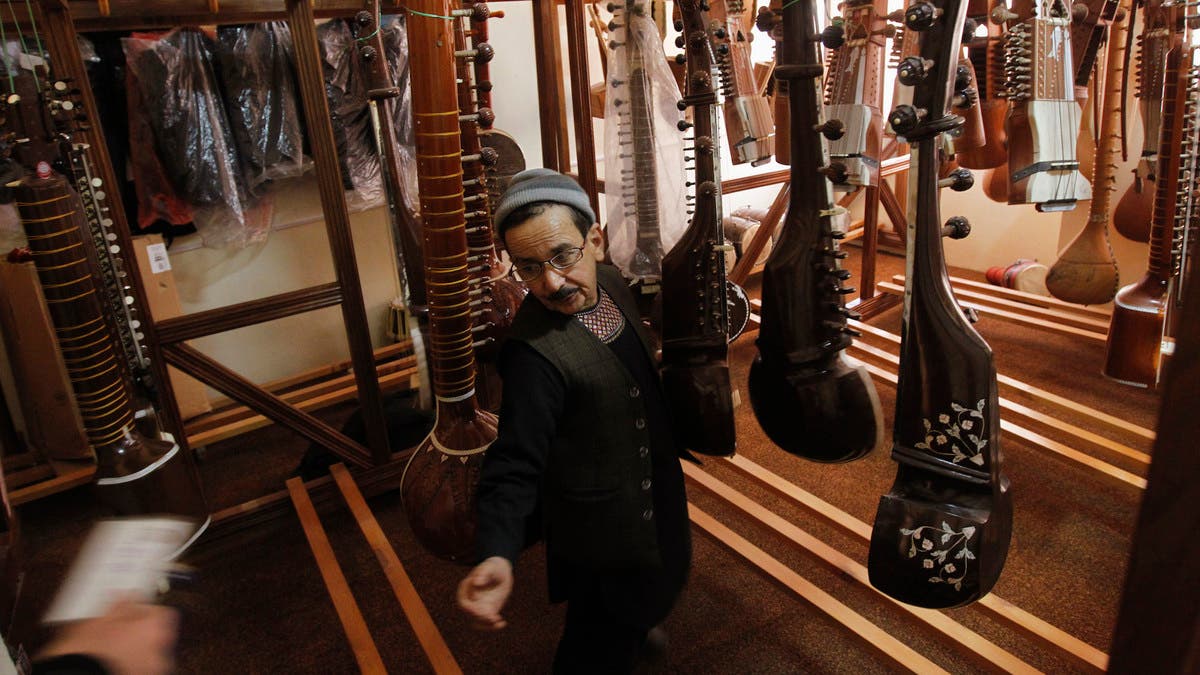Nabih Bakhsh’s family has been part of Afghanistan’s musical tradition for generations. His great-grandfather was a musician in the court of the Afghan emperor 150 years ago. His father was a famous maestro and singer. Bakhsh too carried on the family art, performing and running an instrument repair shop.
Until now. The 70-year-old had to give up music and turn his shop into a convenience stall selling soda.
Since the Taliban’s blitz takeover of Afghanistan six months ago, the songs have gone silent in the historic musicians' quarter of Kabul. Gone are the instruments that once filled shop windows in the alleys of Kucha-e-Kharabat. Their owners packed them and left, putting a centuries-old Afghan musical heritage at risk of vanishing.
Many are being driven out as work has dried up both because of the country's economic collapse and out of fear of the Taliban. The Taliban government has not formally banned music, but musicians say individual Taliban fighters take matters into their own hands and target them, halting performances and breaking their instruments because they say music is “haram,” or proscribed by Islamic law.
For the latest headlines, follow our Google News channel online or via the app.
On a recent day, Nazir Amir Mohammed tearfully bid farewell to his family. A minibus waited to take him and other musicians to Iran, where they hope they can practice freely and pass their expertise down to the next generation.
In a bag, concealed between layers of clothing, was his beloved rubab, a traditional lute-like instrument that took Mohammed 10 years to master.
“The Taliban came to this street, told us music is not allowed and should be banned,” he said. Like most of the street’s residents, his income had come from playing at weddings, concerts and parties. Now that is gone.
Those who stay have adapted to new realities. Instrument repair shops that lined the street have transformed into small stalls selling soda and chips, or garments. Traditional instruments are hidden in homes, or even buried – including drums, lutes and harmoniums, an accordion-like instrument.
Instruments are also gone in the bazaar of Kucha Shor, meaning “Noise Street.” Here, shopkeepers have turned to selling kites, a national pastime.
Empty is the famed music school, Afghanistan’s only formal one, its pupils and teachers evacuated. Taliban stand guard outside.
In Kucha-e-Kharabat, classical music traditions have been passed down for generations, dating back to the 1860s when Afghan emperor Sher Ali Khan invited Indian masters to enrapture Kabul’s royal court.
The convergence of two music cultures bestowed Afghanistan with a unique fusion: Indian classical music structures are blended with Afghan traditional folk songs. Like in India, Afghan music is also an oral tradition. The young study for years under a single master, called an ustad, and carry on their legacy.
Bakhsh’s great-grandfather, Ustad Khudabakh, was one of the first Indian masters to heed the emperor’s call. After a lifetime in music, Bakhsh now sells sodas to get by, making about 100 afghanis ($1) a day. Worshippers at the nearby mosque are his main customers.
All that remains of the shop’s past life is the empty shell of a harmonium, full of rags. “I don’t know what happened to the guy who commissioned me to repair it, he must have left,” he said.
“We don’t have any other skills, music is our life,” he said. “We don’t know how to be merchants, we don’t even know how to use weapons to rob people.”
Residents are fearful of Taliban fighters.
One month ago Zabiullah Nuri, 45, was carrying his harmonium home from his shop when a Taliban patrol saw him.
“They beat me and took my instrument. They broke it with their guns,” he said, sitting in his home and holding up the remnants of his harmonium.
To make ends meet, Nuri sold everything he could, including his television.
“Everything is finished, my whole life has changed,” he said.
Issa Khan, 38, was an hour into playing at an engagement party in a private residence when a group of Taliban stormed in. The militants also broke his instrument and told him music was forbidden.
He stopped playing after that.
But folk tunes still ring out from the home of Mobin Wesal. The 35-year-old singer’s voice enlivens the empty salon, bare except for his instruments packed away in the corner.
The tune is a Pashtu favorite: “Teacher please don’t fail me in my exams. Love has made me an idiot.”
He was part of a new generation of Afghan musicians breathing life back into their heritage, he said, by introducing new lyrics and clever styles into the art form.
His younger son sat listening intently. “I won’t teach him,” Wesal said, motioning toward the boy. “He would be in danger.”
Read more:
Taliban orders Afghan girls schools shut hours after reopening: Spokesman
Parents of photographer killed in Afghanistan start legal action against Taliban
UN establishes ties with Taliban-governed Afghanistan

 World3 years ago
World3 years ago
 World3 years ago
World3 years ago
 Business1 year ago
Business1 year ago
 Entertainment7 years ago
Entertainment7 years ago
 World7 years ago
World7 years ago
 Entertainment7 years ago
Entertainment7 years ago






